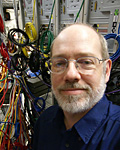A Gate-Level Approach To Compiling for Quantum Computers
Category
Published on
Abstract
A lot of interesting and exotic physics go into making a quantum computer -- but this talk isn't about that. Our goal is simply to leverage understanding of conventional computing to take advantage of the benefits offered by quantum computation.
Programming language constructs generally operate on data words, and so does most compiler analysis and transformation. By instead transforming complete programs into gate-level operations on individual bits, and optimizing operations at that level, it is possible to dramatically reduce the total amount of computational resources needed to execute a program’s algorithm. Such a gate-level representation also can be transformed to use other types of logic gates, including ones that efficiently can be implemented by quantum computers. We have created a simple prototype of such a system, which compiles C code into adiabatic CSWAP (Fredkin) gates without fanout. This talk will briefly present a computer engineer's view of quantum computing, overview our approach, describe the current state of the prototype compiler, and suggest some ways in which compiler automatic parallelization technology might be extended to allow ordinary programs to take better advantage of the unique properties of quantum computers.
Bio
 Henry (Hank) Dietz has been a Professor of Electrical and Computer Engineering, and the James F. Hardymon Chair in Networking, at the University of Kentucky since 1999. Before that, from 1986, he was a member of the ECE faculty at Purdue. While there, Dietz's group created the Purdue Compiler Construction Tool Set (PCCTS/Antlr) and, in February 1994, built the world's first Linux PC cluster supercomputer. Unlike his 200+ peer-reviewed technical publications, the Parallel Processing HOWTO he wrote to help others build clusters and use Linux for supercomputing has been read by millions. At Kentucky, his continuing work creating new supercomputing technologies, such as Flat Neighborhood Networks (FNNs), has been recognized by Gordon Bell and Computerworld Smithsonian awards. In support of the high-resolution video walls he used to demonstrate his clusters, Dietz also became active in digital imaging research, and over the last decade has been publishing work in computational photography as well as in compilers and parallel computer architecture.
Henry (Hank) Dietz has been a Professor of Electrical and Computer Engineering, and the James F. Hardymon Chair in Networking, at the University of Kentucky since 1999. Before that, from 1986, he was a member of the ECE faculty at Purdue. While there, Dietz's group created the Purdue Compiler Construction Tool Set (PCCTS/Antlr) and, in February 1994, built the world's first Linux PC cluster supercomputer. Unlike his 200+ peer-reviewed technical publications, the Parallel Processing HOWTO he wrote to help others build clusters and use Linux for supercomputing has been read by millions. At Kentucky, his continuing work creating new supercomputing technologies, such as Flat Neighborhood Networks (FNNs), has been recognized by Gordon Bell and Computerworld Smithsonian awards. In support of the high-resolution video walls he used to demonstrate his clusters, Dietz also became active in digital imaging research, and over the last decade has been publishing work in computational photography as well as in compilers and parallel computer architecture.
Sponsored by
Cite this work
Researchers should cite this work as follows:
Time
Location
EE 317, Purdue University, West Lafayette, IN